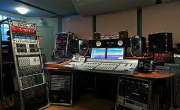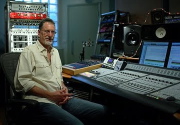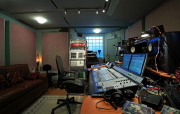Interviewed by Russ Hughes - October 15, 2009
Some reading the title of this interview might think the word 'legendary' as hyperbole, but take a moment to read his gigantic discography and I think you'll agree that the word is a fair one. Mick Glossop was there at the birth of the Townhouse using one of the first SSL boards, the birth of the Phil Collins drum sound, and during his journey worked with everyone from Zappa to Van Morrison. So the big question is why have an interview with such a production great on the AIR Users Blog? The answer is a simple one, Mick works in Pro Tools, uses AIR gear and is a fan of the blog, as far as I'm concerned that's as near as damn it a Royal Appointment. Even better on a wet Tuesday night in September Mick and I met up for a beer and shot the breeze about music, gear, beer and everything else, he also agreed to an interview for the blog... enjoy!
Mick, nice to catch up with you. Like me, you've seen a lot of technology come and go in the last 30 years, I think we've both forgotten some of the gear that at the time was so essential to the recording process, so what technology has most impacted your work in that period and has stayed with you on the journey?
I think the only technology I've discarded is analogue tape - although I've started experimenting recently with tape overload distortion. All my recording these days is digital, and mostly in Pro Tools. I still use analogue compressors, equalisers, filters, all manner of processors, synths, reverbs, etc. Pro Tools is probably the single piece of technology that has had the biggest influence.
Thanks, so when was the switch to Pro Tools, and why?
I didn't actually switch to Pro Tools. I started off with a 4-track 442 system, running (I think) Pro Tools 3.2 software. I used it as an editor/processor, running alongside analogue tape. For me, the process was more of a gradual movement away from recording on tape as Pro Tools became more viable as a complete production system, around about software version 5.
Do you mix in the box or are you still a 'real' mixer man?
I do both, depending in the project and budget, and sometimes, as in my own Pro Tools-based studio, I use a hybrid setup. Some tracks pre-mixed in-the-box, using up to 24 Pro Tools outputs running through my analogue processors and my TLA 8-channel tube mixer into my own completely passive, analogue summing unit (which I built myself, for £35).
So let's talk about AIR, what AIR plugins are you using?
Structure is my principal sampler. I also use Boom, Xpand2 & Vacuum What do you like about the AIR plugins? They're easy to use and convenient, but to be honest, there's nothing really revolutionary about them.
We've talked about sampling and synths, are you looking for a great copy of a sound or are you trying to find sounds not used before?
Both - it depends on the application. Sometimes I need a great-sounding acoustic piano, or upright bass, and sometimes I need a completely new sound and I'd probably use a sample as a source, and then process it using something else.
One issue a lot up and coming engineers and producers struggle with is combining real instruments with VI's and samplers. Can you give any advice?
I don't find a problem there. Except that sometimes there's an inherent lack of real dynamics in a performance on an electronic instrument compared to an acoustic instrument.
We are constantly bombarded with ads for the next big product, do you fall into that trap?
It's always very tempting to cave in to the promotions, but you have to draw the line somewhere, and one's budget is usually the best guide!
So far we've talked about the recording and production process, one area that often gets overlooked is the mixing and mastering, and for many of our readers this is the area they struggle with most. What advice can you give to them?
There's no quick fix to learning these techniques - it takes time, perseverance and experience...and of course - good ears!
Some reading the title of this interview might think the word 'legendary' as hyperbole, but take a moment to read his gigantic discography and I think you'll agree that the word is a fair one. Mick Glossop was there at the birth of the Townhouse using one of the first SSL boards, the birth of the Phil Collins drum sound, and during his journey worked with everyone from Zappa to Van Morrison. So the big question is why have an interview with such a production great on the AIR Users Blog? The answer is a simple one, Mick works in Pro Tools, uses AIR gear and is a fan of the blog, as far as I'm concerned that's as near as damn it a Royal Appointment. Even better on a wet Tuesday night in September Mick and I met up for a beer and shot the breeze about music, gear, beer and everything else, he also agreed to an interview for the blog... enjoy!
Mick, nice to catch up with you. Like me, you've seen a lot of technology come and go in the last 30 years, I think we've both forgotten some of the gear that at the time was so essential to the recording process, so what technology has most impacted your work in that period and has stayed with you on the journey?
I think the only technology I've discarded is analogue tape - although I've started experimenting recently with tape overload distortion. All my recording these days is digital, and mostly in Pro Tools. I still use analogue compressors, equalisers, filters, all manner of processors, synths, reverbs, etc. Pro Tools is probably the single piece of technology that has had the biggest influence.
Thanks, so when was the switch to Pro Tools, and why?
I didn't actually switch to Pro Tools. I started off with a 4-track 442 system, running (I think) Pro Tools 3.2 software. I used it as an editor/processor, running alongside analogue tape. For me, the process was more of a gradual movement away from recording on tape as Pro Tools became more viable as a complete production system, around about software version 5.
Do you mix in the box or are you still a 'real' mixer man?
I do both, depending in the project and budget, and sometimes, as in my own Pro Tools-based studio, I use a hybrid setup. Some tracks pre-mixed in-the-box, using up to 24 Pro Tools outputs running through my analogue processors and my TLA 8-channel tube mixer into my own completely passive, analogue summing unit (which I built myself, for £35).
So let's talk about AIR, what AIR plugins are you using?
Structure is my principal sampler. I also use Boom, Xpand2 & Vacuum What do you like about the AIR plugins? They're easy to use and convenient, but to be honest, there's nothing really revolutionary about them.
We've talked about sampling and synths, are you looking for a great copy of a sound or are you trying to find sounds not used before?
Both - it depends on the application. Sometimes I need a great-sounding acoustic piano, or upright bass, and sometimes I need a completely new sound and I'd probably use a sample as a source, and then process it using something else.
One issue a lot up and coming engineers and producers struggle with is combining real instruments with VI's and samplers. Can you give any advice?
I don't find a problem there. Except that sometimes there's an inherent lack of real dynamics in a performance on an electronic instrument compared to an acoustic instrument.
We are constantly bombarded with ads for the next big product, do you fall into that trap?
It's always very tempting to cave in to the promotions, but you have to draw the line somewhere, and one's budget is usually the best guide!
So far we've talked about the recording and production process, one area that often gets overlooked is the mixing and mastering, and for many of our readers this is the area they struggle with most. What advice can you give to them?
There's no quick fix to learning these techniques - it takes time, perseverance and experience...and of course - good ears!



